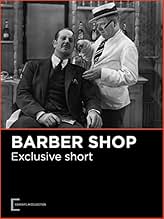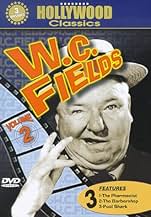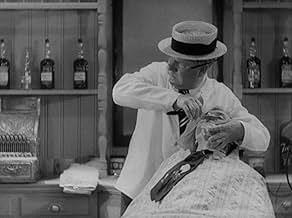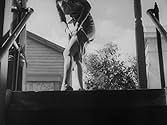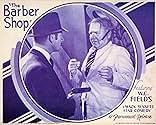Adicionar um enredo no seu idiomaAn inept barber maintains his good-humored optimism in his small town shop despite having a hen-pecking harridan for a wife and a total lack of tonsorial skill.An inept barber maintains his good-humored optimism in his small town shop despite having a hen-pecking harridan for a wife and a total lack of tonsorial skill.An inept barber maintains his good-humored optimism in his small town shop despite having a hen-pecking harridan for a wife and a total lack of tonsorial skill.
- Direção
- Roteirista
- Artistas
John Sinclair
- Mr. Flugg
- (as John St. Clair)
Frank Alexander
- Steam Room Victim - Before
- (não creditado)
Billy Bletcher
- Steam Room Victim - After
- (não creditado)
Joe Bordeaux
- Passerby
- (não creditado)
Harry Bowen
- Cop
- (não creditado)
Joe Calder
- Passerby
- (não creditado)
Julia Griffith
- Mrs. Scroggins - Passerby
- (não creditado)
Fay Holderness
- Little Girl's Mother
- (não creditado)
George Humbert
- Jose
- (não creditado)
William McCall
- Man with Horse
- (não creditado)
Gloria Velarde
- Gloria - Little Girl in Barber's Chair
- (não creditado)
Frank Yaconelli
- Italian Man Selling Bass Fiddle
- (não creditado)
Avaliações em destaque
With the great W.C. Fields in fine form, and a setup that provides him with a lot of good material, "The Barber Shop" is a very enjoyable short comedy. It is filled with the kinds of details and subtle gags that make Fields's comedies worth watching attentively.
"The Barber Shop" closely resembles the Fields feature "The Pharmacist", with very similar settings and stories. Both are very good, and in both of them Elise Cavanna is funny as the domineering wife of Fields's character. Both have some gags that are deliberately absurd, and others that are less obvious. Both feature amusing exchanges between Fields and numerous customers.
When Fields was at his best, he could really get across the wackiness of so much of what happens in daily life, and that's one of the things that works quite well here.
"The Barber Shop" closely resembles the Fields feature "The Pharmacist", with very similar settings and stories. Both are very good, and in both of them Elise Cavanna is funny as the domineering wife of Fields's character. Both have some gags that are deliberately absurd, and others that are less obvious. Both feature amusing exchanges between Fields and numerous customers.
When Fields was at his best, he could really get across the wackiness of so much of what happens in daily life, and that's one of the things that works quite well here.
W.C. plays the title role of the Barber. He gets to flirt with the manicurist in his shop all day, and go upstairs to his unadoring wife at night. His shaving technique is truly frightening, and his steamroom is truly amazing. He even manages to babysit for a neighbor and to capture a criminal in his shop, through no fault of his own, during his very full day. And you haven't lived till you've heard Fields play the bass fiddle!
Fields is good as usual in this film; it's not as hilarious as others of his but is fairly even.
Fields is good as usual in this film; it's not as hilarious as others of his but is fairly even.
Another dose of madness from W. C. Fields, this short sees him playing the part of Cornelius O'Hare, small-town barber with a cutting observation for all who pass his path. Fields comes up with a number of gags that possibly only he would dream up, whether its testing the sharpness of a razor on his tongue, playing a bass fiddle in his own inimitable way, or shaving a hapless customer with all the delicacy of a blind man painting a barn door. This forms a loose trio with The Dentist and The Pharmacist, which Fields also made for Mack Sennett, and all of which present the comedian at the height of his talent although this one is perhaps the weaker of the three.
ONCE IN A LIFETIME, there is a short period of the most unusual, nearly unbelievable events occur. Call it coincidence or a Gift from God; but whatever there is no denying that something very extraordinary has happened. Such was the case at MACK SENNETT STUDIOS in 1932-33; when the four great W.C. Fields sound shorts were made.
TO THE DELIGHT of the Depression Era Moviegoers, the Sennett Fun Factiry had filmed and released what was destined to be a blueprint for what would be the W.C. Fields character and storyline for the rest of his career. Be it at the Movies or on Radio, whatever the character's name was, it was Fields.
OF THOSE PREVIOUSLY mentioned little masterpieces, our subject today, THE BARBER SHOP (Sennett/Paramount, 1933) was the last to reach the movie houses. Prior to this, we had been treated with THE DENTIST (19332), THE FATAL GLASS OF BEER (1933) and THE PHARMASIST ('33).
THESE FOUR SOUND Shorts combined out-produced many a feature length comedy, by far. That they would make an excellent presentation at a revival movie house goes without saying. A number of years ago, we were privileged in attending such a showing. It was a the Wilmette Theatre in suburban Chicago, that a marathon of 'Old Time Comedy Movies' was the playbill for the night. One segment played these four and the old laugh meter was nearly worn out.
AS FOR TODAY'S reviewed subject, THE BARBER SHOP, we can only say that it is that great W.C. Fields show; but with a little variation. He is once again a crusty, grumpy and largely misunderstood father. But this time he seems to have just a little more sympathetic treat from family; particularly from his one son, Ronald (Harry Watson). The son shares an affinity with his Pop for humorous riddles and recites many to please "the Old Man" at the supper table.
AS IS THE case with all of the 3 other Sennett two reelers, Mr. Fields insured his characterization by being the writer of the original stories. (This is clearly evident with the Barber's name, Corneilus O'Hare.) Sennett veteran Gag Man and Director, Arthur Ripley, directed and , many of the old Keystone players are seen in supporting roles.
TO THE DELIGHT of the Depression Era Moviegoers, the Sennett Fun Factiry had filmed and released what was destined to be a blueprint for what would be the W.C. Fields character and storyline for the rest of his career. Be it at the Movies or on Radio, whatever the character's name was, it was Fields.
OF THOSE PREVIOUSLY mentioned little masterpieces, our subject today, THE BARBER SHOP (Sennett/Paramount, 1933) was the last to reach the movie houses. Prior to this, we had been treated with THE DENTIST (19332), THE FATAL GLASS OF BEER (1933) and THE PHARMASIST ('33).
THESE FOUR SOUND Shorts combined out-produced many a feature length comedy, by far. That they would make an excellent presentation at a revival movie house goes without saying. A number of years ago, we were privileged in attending such a showing. It was a the Wilmette Theatre in suburban Chicago, that a marathon of 'Old Time Comedy Movies' was the playbill for the night. One segment played these four and the old laugh meter was nearly worn out.
AS FOR TODAY'S reviewed subject, THE BARBER SHOP, we can only say that it is that great W.C. Fields show; but with a little variation. He is once again a crusty, grumpy and largely misunderstood father. But this time he seems to have just a little more sympathetic treat from family; particularly from his one son, Ronald (Harry Watson). The son shares an affinity with his Pop for humorous riddles and recites many to please "the Old Man" at the supper table.
AS IS THE case with all of the 3 other Sennett two reelers, Mr. Fields insured his characterization by being the writer of the original stories. (This is clearly evident with the Barber's name, Corneilus O'Hare.) Sennett veteran Gag Man and Director, Arthur Ripley, directed and , many of the old Keystone players are seen in supporting roles.
THE BARBER SHOP (Paramount, 1933), directed by Arthur Ripley, marks the fourth and final Mack Sennett Star Comedy short to feature W.C. Fields (who also scripted), following THE DENTIST (1932), THE FATAL GLASS OF BEER (1933) and THE PHARMACIST (1933). Not quite as famous as the initial two, THE BARBER SHOP does bear a strong resemblance to THE PHARMACIST, that of Fields wearing a straw hat with an open top; his encounter with a bank robber; and having Elsie Cavanna (famous as the drill patient in THE DENTIST) in the role of his wife. As with THE DENTIST, however, the customers in THE BARBER SHOP are more victims than patrons. For Fields' final short (lasting 21 minutes), much of it falls into familiar territory in true Fields-comedic style, with touches of originality, especially his chosen character name, pun intended.
Set in Felton City, "Population 873, Elevation two feet below sea level," the story revolves around the day in the life of Cornelius O'Hare (W.C. Fields), a small town barber with a nagging wife (Elsie Cavanna) and a young son, Ronald (Harry Watson). O'Hare's morning starts off peacefully as he sits in front of his place of business (with his home in back of the barber shop), greeting the passing residents while sharpening his razor, then playing his huge bass fiddle he names "Lena." After dining at the breakfast table with his family, O'Hare's work day, shared by his manicurist (Dagmar Oakland), soon comes to a series of mishaps as he shaves off a mole from a man's chin, places an ultra hot towel over that same customer's (John St. Clair) face by holding a pair of tongs, and unwittingly locking a fat man ("Fatty" Alexander) in a steam room before O'Hare's day is complete as he finds himself face to face with an armed bank robber (Cyril Ring).
With Fields being best known playing one with a strong dislike for children and animals, THE BARBER SHOP shows his compassion towards his offspring, listening attentively listening to his riddles, rather than being short-tempered towards his annoyance. In fact, there's even a brief scene where he happily throws a ball over to the neighborhood street kids, only to have it landing on top of a man's noggin. So not to be a total loss, the plot does include Fields' encounter with a baby in a stroller hitting him over the head with a milk bottle, as well as his involvement with Mrs. Broadbottom's (Fay Holderness) bratty daughter, Gloria, wearing an assortment of party hats. A dog takes part sitting by the barber's chair awaiting for another chance for O'Hare to accidentally cut off an ear while shaving a customer, but all the dog can do is witness some "close shaves."
Although the brief climatic chase and its closing fail to recapture some rather amusing scenes earlier in the story, THE BARBER SHOP does recapture classic routines originated on stage by Fields himself, some for which he reprized to better advantage in his later feature film comedies. With Alison Skipworth and Kathleen Howard making the grade as Fields' most notable co-stars during his years (1932-38) at Paramount, Elsie Cavanna shouldn't go unnoticed with her participation in three of Fields four comedy shorts, with THE DENTIST as their most famous and revived.
THE BARBER SHOP, along with other Fields' shorts, has turned up occasionally on television over the years, notably cable stations (American Movie Classics in the 1990s, and Turner Classic Movies a decade later), and distribution on video and DVD formats, with best possible prints from the Criterion Collection. For some amusements, watch Cornelius O'Hare's barber shop methods. For a good haircut and a shave, try someplace else. (***)
Set in Felton City, "Population 873, Elevation two feet below sea level," the story revolves around the day in the life of Cornelius O'Hare (W.C. Fields), a small town barber with a nagging wife (Elsie Cavanna) and a young son, Ronald (Harry Watson). O'Hare's morning starts off peacefully as he sits in front of his place of business (with his home in back of the barber shop), greeting the passing residents while sharpening his razor, then playing his huge bass fiddle he names "Lena." After dining at the breakfast table with his family, O'Hare's work day, shared by his manicurist (Dagmar Oakland), soon comes to a series of mishaps as he shaves off a mole from a man's chin, places an ultra hot towel over that same customer's (John St. Clair) face by holding a pair of tongs, and unwittingly locking a fat man ("Fatty" Alexander) in a steam room before O'Hare's day is complete as he finds himself face to face with an armed bank robber (Cyril Ring).
With Fields being best known playing one with a strong dislike for children and animals, THE BARBER SHOP shows his compassion towards his offspring, listening attentively listening to his riddles, rather than being short-tempered towards his annoyance. In fact, there's even a brief scene where he happily throws a ball over to the neighborhood street kids, only to have it landing on top of a man's noggin. So not to be a total loss, the plot does include Fields' encounter with a baby in a stroller hitting him over the head with a milk bottle, as well as his involvement with Mrs. Broadbottom's (Fay Holderness) bratty daughter, Gloria, wearing an assortment of party hats. A dog takes part sitting by the barber's chair awaiting for another chance for O'Hare to accidentally cut off an ear while shaving a customer, but all the dog can do is witness some "close shaves."
Although the brief climatic chase and its closing fail to recapture some rather amusing scenes earlier in the story, THE BARBER SHOP does recapture classic routines originated on stage by Fields himself, some for which he reprized to better advantage in his later feature film comedies. With Alison Skipworth and Kathleen Howard making the grade as Fields' most notable co-stars during his years (1932-38) at Paramount, Elsie Cavanna shouldn't go unnoticed with her participation in three of Fields four comedy shorts, with THE DENTIST as their most famous and revived.
THE BARBER SHOP, along with other Fields' shorts, has turned up occasionally on television over the years, notably cable stations (American Movie Classics in the 1990s, and Turner Classic Movies a decade later), and distribution on video and DVD formats, with best possible prints from the Criterion Collection. For some amusements, watch Cornelius O'Hare's barber shop methods. For a good haircut and a shave, try someplace else. (***)
Você sabia?
- CuriosidadesThis film is included on "W.C. Fields - Six Short Films", which is part of the Criterion Collection, spine #79.
- Citações
Cornelius O'Hare: I'm the worst barber in town, my wife can tell you that.
- ConexõesEdited into W.C. Fields: 6 Short Films (2000)
Principais escolhas
Faça login para avaliar e ver a lista de recomendações personalizadas
Detalhes
- Tempo de duração
- 21 min
- Cor
- Mixagem de som
- Proporção
- 1.37 : 1
Contribua para esta página
Sugerir uma alteração ou adicionar conteúdo ausente

